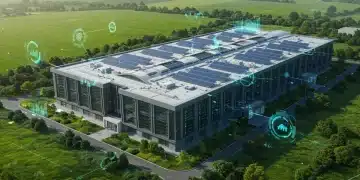Enhanced knowledge for sustainable living: transforming your space

Innovative technologies for a sustainable lifestyle include smart home devices, electric vehicles, and renewable energy solutions, all of which significantly reduce environmental impact and promote eco-friendly living.
Enhanced knowledge for sustainable living is becoming increasingly important in today’s world. Have you ever wondered how small changes in your daily life can make a big impact on the environment? Let’s dive into how you can create a sustainable home.
Understanding sustainable living practices
Understanding sustainable living practices is vital for everyone who aspires to make a positive impact on our planet. By embracing eco-friendly habits, we contribute to a healthier environment.
What is sustainable living?
Sustainable living means adopting a lifestyle that reduces the environmental impact of our choices. This approach focuses on using resources wisely and minimizing waste. It encourages us to be mindful of how our actions affect the Earth.
Why is it important?
Adopting sustainable living practices protects natural resources and ensures a better future for generations to come. It helps combat climate change and preserve biodiversity.
- Conserves natural resources
- Reduces pollution
- Supports local economies
- Enhances overall well-being
Integrating these practices into our daily lives can start with simple changes. For instance, using reusable bags instead of plastic ones is a smart choice. Similarly, opting for energy-efficient appliances saves both energy and money. Each small decision contributes to a larger positive impact.
Additionally, growing your own food can be both rewarding and sustainable. It reduces the carbon footprint associated with transporting food while providing fresh produce. Practicing sustainable living takes effort, but the benefits are well worth it.
How to start?
Begin your journey towards sustainability by setting achievable goals. Start by implementing one or two practices a week, such as composting or reducing water waste. As you become more comfortable, you can expand your efforts.
- Start composting organic waste
- Use public transport or bike
- Reduce energy consumption
- Choose sustainable products
Engaging with community initiatives also boosts motivation. Collaborating with others who value sustainability can provide support and new ideas. Together, we can create a more sustainable world.
Benefits of enhanced knowledge for sustainability

Understanding the benefits of enhanced knowledge for sustainability is essential for those looking to make a difference in their communities and the planet. When we equip ourselves with knowledge, we can take effective actions that lead to positive change.
Empowering Individuals
Enhanced knowledge gives individuals the power to make informed choices. This means understanding the impact of our daily actions on the environment. When we know better, we can do better.
Community Impact
By sharing sustainable practices, individuals can inspire their communities. Awareness and knowledge foster collective actions that can lead to significant environmental benefits. For example, community gardening projects can lead to better access to fresh produce.
- Strengthens community bonds
- Improves local food systems
- Encourages collective sustainability efforts
- Promotes environmental awareness
Enhanced knowledge also leads to innovation. Individuals and businesses can explore new technologies and methods to reduce waste and lower their carbon footprint. Sustainable practices often result in long-term cost savings, which is especially beneficial for businesses.
Another benefit includes improved health. Sustainable living often goes hand-in-hand with a healthier lifestyle. Choosing organic or locally sourced foods can reduce exposure to harmful chemicals. Additionally, energy-efficient homes provide cleaner air and a more comfortable living environment.
Global Perspective
On a global scale, enhanced sustainability knowledge promotes better resource management. This is crucial as we face worldwide challenges like climate change and biodiversity loss. Sharing knowledge fosters collaboration across borders, leading to innovative solutions that address these global issues.
- Promotes responsible resource use
- Encourages sustainable development
- Supports international cooperation
- Drives policy changes
In summary, enhanced knowledge for sustainability creates a ripple effect. As more people understand the significance of their choices, the cumulative impact can lead to a healthier planet.
Practical steps for achieving sustainability at home
Implementing practical steps for achieving sustainability at home can significantly reduce your environmental footprint. With straightforward actions, you can make your living space more eco-friendly.
Start with Energy Efficiency
One of the easiest ways to promote sustainability at home is to focus on energy efficiency. This includes switching to LED light bulbs and unplugging devices when not in use. Consider utilizing smart home technology, which allows for better control of energy consumption.
- Use energy-efficient appliances
- Install programmable thermostats
- Seal windows and doors
- Consider renewable energy options like solar panels
By taking these steps, you not only save energy but also reduce your electricity bill.
Reduce Water Usage
Water conservation is another essential aspect of sustainable living. Simple changes like fixing leaks, installing low-flow showerheads, and using water-efficient toilets can make a big difference.
Additionally, capturing rainwater for gardening is an excellent way to recycle water. Every drop counts when it comes to preserving our precious resources. Remember, small changes lead to significant results over time.
- Collect rainwater for outdoor use
- Limit outdoor watering during peak hours
- Use mulch in gardens to retain moisture
Furthermore, being mindful of how you use water while brushing your teeth or washing dishes helps conserve this vital resource.
Embrace Sustainable Materials
Another step is to choose sustainable materials for your home. This applies to both products and furnishings. For example, opt for bamboo flooring or recycled materials when renovating your space.
Also, prioritize purchasing items made from biodegradable materials. By making conscious decisions, you set a positive example for your family and community.
- Choose products with minimal packaging
- Support local and sustainable brands
- Upcycle furniture and decor
By embracing these practices, you contribute to a healthier environment and promote sustainable lifestyles.
Innovative technologies for a sustainable lifestyle

Innovative technologies play a crucial role in promoting a sustainable lifestyle. These advancements help us reduce our environmental impact and make more conscious choices every day.
Smart Home Devices
Smart home technologies are becoming more prevalent and offer many ways to enhance energy efficiency. Devices such as smart thermostats can learn your habits and optimize energy use accordingly. By automatically adjusting temperature settings, these devices lower energy consumption without sacrificing comfort.
- Reduce energy costs
- Monitor energy usage in real-time
- Control devices remotely
This level of control makes it easier for families to choose eco-friendly practices without extra effort.
Sustainable Transportation
Another area of innovation is in sustainable transportation. Electric vehicles (EVs) are gaining popularity due to their lower emissions. Public transport systems that integrate real-time tracking make it easier for people to choose greener modes of travel. Options like car-sharing services also reduce the number of vehicles on the road.
Moreover, advances in cycling technology, such as electric bikes, encourage people to choose biking over driving for short distances. These alternatives not only improve air quality but also promote a healthier lifestyle.
- Electric and hybrid cars
- Enhanced bike-sharing programs
- Integration of public transport apps
These technologies foster more sustainable choices in our daily commutes.
Renewable Energy Solutions
Renewable energy technologies are essential for achieving sustainability. Solar panels and wind turbines enable individuals and businesses to produce their own clean energy. With the right setup, you can significantly reduce reliance on fossil fuels.
Battery storage solutions also improve the efficiency of renewable energy systems. By storing excess energy, households can use it during peak demand times, making the energy use more efficient.
- High-efficiency solar panels
- Home battery storage systems
- Smart grids that optimize energy distribution
These innovations help create a more resilient energy system that benefits both people and the planet.
In conclusion, embracing innovative technologies is essential for fostering a sustainable lifestyle. By adopting smart home devices, improving transportation methods, and utilizing renewable energy solutions, we can significantly reduce our environmental impact. Each small action leads to a greater collective effort, making a difference for our planet. Through awareness and conscious choices, we can create a cleaner, healthier world for future generations.
FAQ – Frequently Asked Questions about Sustainable Living Technologies
What are smart home devices?
Smart home devices are technologies that enhance energy efficiency by allowing remote control of home appliances, heating, and lighting.
How do electric vehicles contribute to sustainability?
Electric vehicles produce zero tailpipe emissions, reducing air pollution and reliance on fossil fuels, which helps combat climate change.
What are some examples of renewable energy solutions?
Examples include solar panels, wind turbines, and home battery storage systems that allow homeowners to generate and store clean energy.
How can I start living a more sustainable lifestyle?
You can start by making small changes, such as using energy-efficient appliances, reducing water usage, and exploring public transport options.





